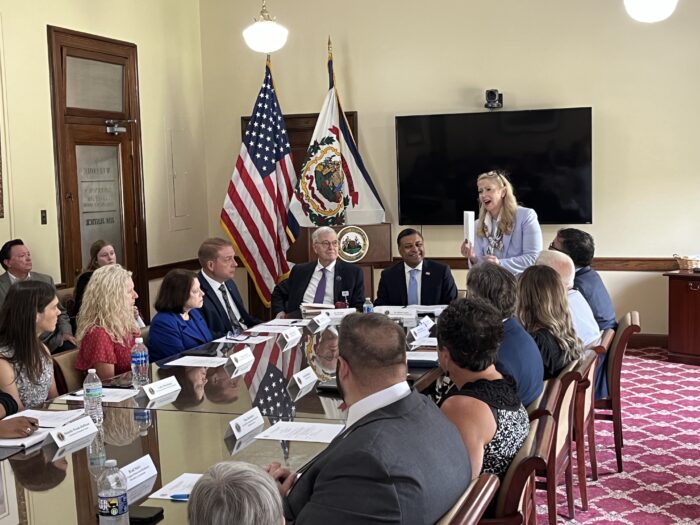Dozens of West Virginians working to mitigate the state’s substance use crisis filled the Governor’s Conference Room at the Capitol building in Charleston on Friday to discuss their efforts with the director of the Office of National Drug Control Policy (ONDCP), Dr. Rahul Gupta.
Gupta is originally from West Virginia and served as the Health Commissioner of the state under two governors before leading the opioid crisis response efforts as the state’s Chief Health Officer.
He has spent the week touring his home state for a variety of events, meetings and conversations.
At the roundtable discussion, Gupta heard from more than 30 of the state’s leaders about their work to reduce overdoses, increase access to addiction treatment and support recovery-ready workplaces.
“It’s been helpful because we’ve learned a number of things of how more dollars more resources can be released, what regulatory barriers might be there,” Gupta said. “How can we get more life-saving medications into the hands of people? And how can we expand treatment, balanced law enforcement as well as the public health side of this?”
The availability of the opioid overdose reversal drug, Naloxone, also known as Narcan, was a large topic of discussion at the roundtable.
“We are trying to get more Naloxone, the reversal drug for opioid overdose across communities, make it more available. We’ve done a few things. We’ve gotten it available over the counter. We’ve reduced significantly the price of it, we’ve extended more resources, more money to state to be able to purchase it,” Gupta said. “Now the hard part comes which is making sure that we are able to distribute that to high-risk populations where and when it’s needed.”
Gupta highlighted the Biden-Harris Administration’s “White House Challenge,” a call to action to stakeholders across all sectors to commit to saving lives by increasing training on and access to opioid overdose reversal medications.
“The goal here is to house Naloxone, make it available, train people on Naloxone and make sure that when somebody is overdosing from drugs, we have it available so we can save life, because saving life is the first step in getting people the help they need,” Gupta said. “That’s one of the reasons why we’re able to see a 5 percent decline in overdose deaths in 2023.”
While the national rate of overdose decreased, West Virginia saw a 1.34 percent increase during the same period, according to data from the Centers for Disease Control and Prevention (CDC).
Appalachia Health News is a project of West Virginia Public Broadcasting with support from Marshall Health.

























